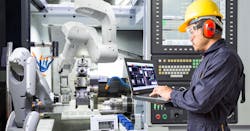Those of us who are parents want nothing more than to ensure our children are “better off” than we are. We want our kids to build a promising career that allows them to do meaningful work and raise a family. The hard part is helping them figure out how to do that.
Here’s what too many parents don’t know: The answer can often be modern manufacturing. A career in modern manufacturing is high paying—and often does not require a debt-inducing four-year college degree. The average manufacturing employee earns about 25% more in pay and benefits than the average worker across all industries. The work itself is high tech, hands-on and fulfilling. Today’s manufacturing companies are technology companies, relying on coders, programmers, technicians and more to keep production running.
But you don’t have to take our word for it. October 5 is national Manufacturing Day. Across the country, manufacturers will open their doors to show parents, teachers, students and community members the incredible work that’s going on in their local area. They will showcase the modern technology that is at the heart of today’s industry, and employees and company leaders will talk about the products they make—products that are essential to our day-to-day lives and include everything from smart electronics and automobiles to food, medicine, fuel and apparel.
You can find a Manufacturing Day (MFG Day) event in your area at MFGDay.com. Think of it as modern manufacturing’s career open house.
By visiting a manufacturing company, parents and students are much more likely to see manufacturing as a viable career path. Why? Because they will see the opportunities available—and see many of the preconceived notions about manufacturing vanish.
One of those misconceptions is that there are not actually jobs available in manufacturing. In reality, at last count, manufacturers have more than half a million jobs to fill right now in America. For perspective, that exceeds the population of a major city like Atlanta, Miami, New Orleans, Cleveland or Kansas City.
Manufacturers have never been more eager to fill jobs. It’s a job seeker’s market in our industry, which is why we host MFG Day in the first place. Nearly 80% of manufacturers report that they are worried about their ability to find the skilled workers their businesses need to continue succeeding.
Any parent who wants to see their children pursue a career in an in-demand field needs to look no further than modern manufacturing. In addition to the more than 500,000 jobs open today, we expect to have many more to fill in the coming years. In fact, a study from The Manufacturing Institute and Deloitte found that manufacturers could have as many as 3.5 million jobs to fill through 2025.
For someone looking to launch a career or find a new one, this is an incredible opportunity. For manufacturers, it’s also an urgent crisis—one that demands the collective efforts of educators, government officials and manufacturing leaders all working together to connect skilled workers with manufacturers across the country. After all, our economy’s strength is affected profoundly by manufacturing’s success, which in turn is determined by our workforce.
So, in addition to MFG Day, manufacturers are undertaking a wide range of projects to bring even more people onto their teams. For example, the Manufacturing Institute’s Heroes MAKE America program is training returning service members with the skills needed for them to transition into manufacturing careers. The NAM has worked directly with the White House and the Department of Labor to modernize and expand apprenticeship programs in America.
This is a long-term challenge to be sure, but above all, it’s a promising opportunity for young people. And parents should be reassured that modern manufacturing offers what they want for their children: a solid career, a bright future and a chance to be “better off.” See for yourself today and throughout the month at an MFG Day event near you.
Jay Timmons is president and CEO of the National Association of Manufacturers and Carolyn Lee is executive director of the Manufacturing Institute.
About the Author
Jay Timmons
Jay Timmons is president and CEO of the National Association of Manufacturers.
